Last week someone released a knockoff of Rebuild for the iPad. When I contacted them, the publisher politely said it was a mistake and took it down immediately, but it reminded me of what’s at stake if I take my time with the sequel (which will come out for iPad as well as Flash).
It also got me thinking about the topic of clone games, which have always bothered me, but I find it hard to pin down exactly what constitutes a clone and why I find them offensive. The conversation tends to gets heated when the topic comes up, but I think it’s important that we talk about it all the same. It’s going to buzz around my brain until I do so I decided to look at some examples and ask some questions.
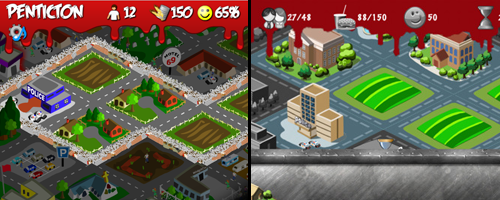
The Rebuild clone is an extreme case and it’s been taken down, but I’d like to start with it. The gameplay was the same, the art was better but strikingly similar and the events were rewritten in different words. Perfectly legal, except that they named it “Rebuild” which was probably an accident. I think it’s crazy that someone could spend so much effort to produce a beautiful and polished game while skipping the fun part of designing the gameplay. I imagine profit must be the only motive, but I’m not sure. I am sure that it shouldn’t have been legal.
There are good reasons why you can’t copyright gameplay. Gameplay is hard to define, and borrowing ideas from earlier games is an important part of how genres evolve. I agree, it would suck if someone owned the copyright on aiming with a mouse, or levelling-up a character, or if Square Enix could sue you for using the FFVII class system in your vector-based robot platformer. I’m happy anyone can iterate and expand on ideas from other games, but there’s a difference between that and being a total, shameless knockoff.
Clones are like porn: you know it when you see it.
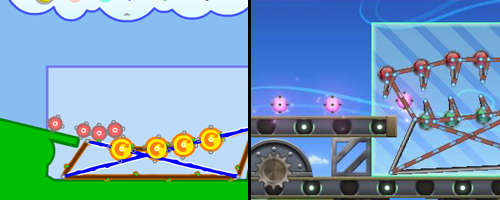
After Colin wrote Contraption, he started negotiations for an iPhone port with a developer but it fell through when Colin realised the deal they offered was rediculously out of scope with the industry standard. Three months later they released a nearly exact clone of Colin’s game with a pretty graphical makeover, almost beating our real port to the iPhone market (free tip: before you deal with someone see how many outstanding law suits are pending against them). Apple didn’t take it down, but (with our publisher inExile’s help) they did feature us and the clone got buried.
The situation was unusual because Colin new the cloner and suspects they’d already started on the game (as an official Contraption port) before negotiations collapsed. It might have held up in court if it had been worth suing over, but I’m really glad we didn’t have to find out.
Don’t rely on Apple to make any moral decisions regarding knockoffs. They’ll take something off the App Store if it violates copyright, ie if it uses your name or characters or graphics, but they’re slow and don’t reply whether they decide to act or not.
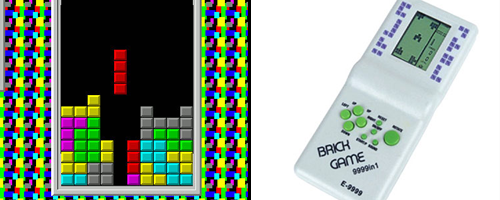
Possibly the most cloned game ever, Tetris, has been beset with copyright problems since the get-go. Knockoffs show up everywhere from naughty versions on xxx sites to “9999 in 1 Russia Brick Game” handhelds at dollar stores. Last month the company that owns Tetris sent Google a DMCA notice regarding 35 games on the Android market which were all promptly removed. Some of them used the word “Tetris” which is unarguably illegal, but many just had similar gameplay.
It’s interesting that this sue-happy company can so easily throw their weight around to enforce copyright on a 30 year old title. I guess the system does work for some people. But I wonder if Tetris is so well known that it should be considered a genre in itself, gameplay in the public domain. Did any of the unauthorized games combine new and interesting concepts with our beloved block game?
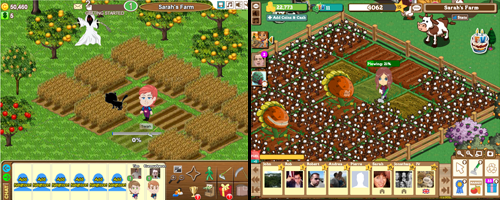
Facebook games all look the same, to someone uninterested in spamming her friends every time she grows a tomato. Talk about shameless mimicry! Consider Zynga‘s multi-billion dollar line of clones: FarmVille, PetVille, Café World, Mafia Wars. They wait for a game to be successful, copy it to a T, then aim their firehose of players at it – ka-ching! They must have a strong sense of irony, because now Zynga’s threatening to sue people for using “-ville” in their game names.
Granted, they’re not the only ones at it, and Zynga is spectacularly good at optimizing games to maximize virality and revenue. Did FarmTown lose money when it got cloned, or did the sudden popularity of farming games bring them new players? Is there room in a player’s feed for two (or three, or four) such similar games?

Microsoft just announced that Minecraft is coming to XBLA. This must be a disappointment to the creators of top-selling XBLIG game FortressCraft, one of the most recent in the genre of “first person multiplayer voxel art mining sandbox roguelikes”. Unlike the owners of Tetris, Notch has no intention of suing, in part because he wouldn’t have a leg to stand on: Minecraft started as a self-admitted clone of Infiniminer (by Zachary Barth, creator of SpaceChem).
You could argue that the world wouldn’t have discovered this new genre if Minecraft hadn’t picked up after Infiniminer was cancelled and iterated on it to make a really great game. On the other hand, the graphical similarities are so obvious it’s embarassing. Barth says he’s flattered that his game design has become so popular, and leaves it at that.
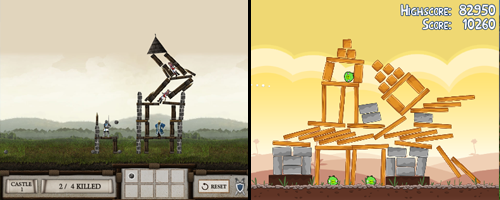
Angry Birds has been in the App Store top 3 for over a year and has made over 70 million dollars. Apple constantly features the game because it’s in their interest to have fewer, more popular games whose household names might intice people to buy an iPhone or iPad. Few games get into the top 10 and they tend to stay there, which makes developing for the iPhone kind of like playing a slot machine.
As you probably suspected, Angry Birds’ gameplay was copied from a Flash game called Crush The Castle. The difference this time is that Angry Birds used a completely different look, having you whimsically toss suicidal birds at pigs instead of cannonballs at armored men. It feels good, it sound good, and it’s obvious why even our parents are playing this game.
Is it innovation if you just change the setting? I know I wouldn’t have been so miffed at the Rebuild clone if you were fighting aliens on a moon base instead of zombies in an identical looking city.
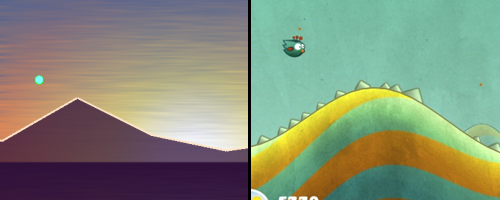
In another case of innovation via higher production values, top-selling iPhone game Tiny Wings is far, far more polished than an earlier game WaveSpark which used the same gameplay. WaveSpark was created as part of a project to write a different game every week, and the creator Nathan McCoy didn’t spend a lot of time making it look good. It goes to show that polish pays. So do cute birds.
It seems that’s what players care about, as McCoy’s request for credit was met with jeering at his game’s simple graphics. I’m hesitant to call Tiny Wings a clone, but I’d like to see developers (and fans) give credit to games that inspired theirs. Do they not for fear of being sued?
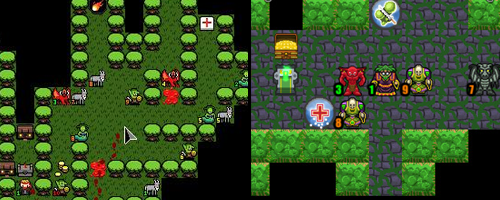
QCF Design has finally started preorders for Desktop Dungeons, and last week they briefly had a beta version of the game online (I’m bummed I missed it). They’re being secretive for good reason: they’ve been burned before.
They started off releasing alpha versions of the game as they were writing it, incorporating feedback from the community and growing a tidy fan base. Then one such fan released an iPhone game copying Desktop Dungeons’ gameplay right down to the classes and spell names. After months of friendly but fruitless discussions between the two developers, QCF finally brought in their lawyer and spoke publicly about the situation. The cloner relented and graciously took his game down.
He didn’t seem like a bad guy. He just wanted to make a good game, and Desktop Dungeons was a good game. But releasing it before the original was even finished? Ouch.
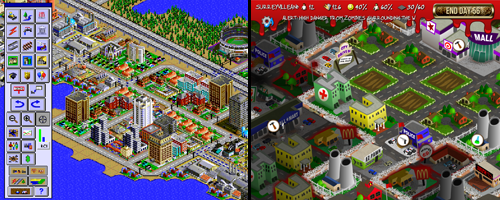
I’m just kidding about this comparison, but SimCity was one of the inspirations for my game. So was X-Com and zombie movies like 28 Days Later and Dawn of the Dead. Like I said, all games borrow from other games and I’m happy they can.
I know I’ve gotten all high and mighty, but there’s a line that gets crossed too often. It just ain’t right, and something needs to change! If the law can’t help and distributors like Apple won’t help, at least players can have an effect by respecting the creators of original gameplay and not buying the knockoffs. Or at least give credit where it’s due and play the original games too.
Colin notes that the real tragedy is that the cloners aren’t just stealing a good idea. They are stealing refined, thought out game design that might have taken years to make work. It takes much less risk to just steal great gameplay and polish up the graphics.
Good thing there will always be foolish indie developers who are more interested in making something cool than simply making money.

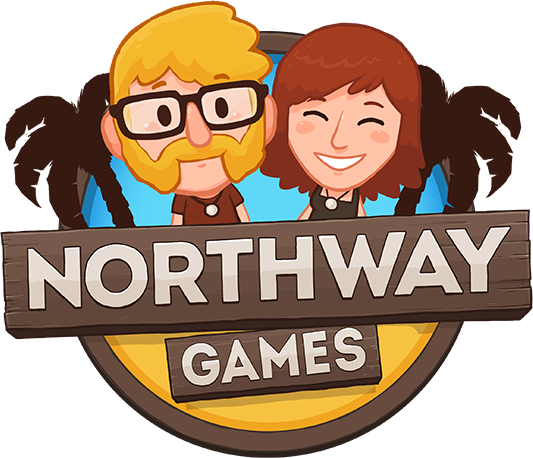
Comments
27 responses to “Rebuild: Regarding Clones”
Wow, great post! I think it’s really disappointing find a copy of your game, but it’s hard to take them down. As you say the biggest mistake its to use the same name. I think is hard to make a real copy of some games, unless you reverse the binaries to get the code. For example the conditions and “randomness” of your game are not clear for the player, so they are to the copier. They have to create a new set of own rules to simulate a similar experience, but that’s almost invisible to label a game as a copy.
To copy and to change things it’s the way to improve. Good thing someone thinks your game worth enough to be copied and improved. But a bad thing not to change it enough to make it different.
I think sometime it’s a copy to make money. Just need to look at the sites that list freelancers, and look some request: “I need a system of xxxx, just as in the yyyy page”. It’s the easy way, but also there are a lot of people that likes to develop games but when running out of ideas try to make a copy of his favorite game.
I like to get ideas from games of early years, when there where books with whole programs to be programmed in your Atari or Amstrad, using Basic. A lot of ideas just didn’t make it to these days.
I like these “cassual” games because shows a different panorama with a lot of ideas. If you look at the consoles best seller games, you only will see a lot of copies with different skins, FPS with different settings and weapons, etc.
In conclusion, copy but make your difference. Give credit to the original idea. But always try to innovate! If your idea succeeded, you will be copied then ;-)
Copying things to be a common thing. It’s always interesting how one company sues another for copying their games even if that one company started out by copying in the first place. I was just reading about this case where a company called Votsu photo-copied Zynga’s games, which I feel it’s downright plagiarism:
http://techcrunch.com/2011/06/16/war-zynga-sues-the-hell-out-of-brazilian-clone-vostu/
I’m not really defending either side, but I feel that if your company has a history of copying, others will follow and do it better than you. And so they did.
Wow, that’s a little shocking. Interesting they haven’t just cloned the games, they cloned the business plans and company setup. They’re kind of making Zynga look good in comparaison.
No way that knockoff’s art is better!
Yours is!
The bar at the top doesn’t look as nice, but the artwork of the actual buildings looks like it might be a bit nicer.
“Shamelessness” is way more common in iOS devices I think.
But you must be really really lucky because you made the game taken down with an e-mail.
I don’t understand that at all. The “shameless” developer worked on that clone for a long time and took it with an e-mail? :D
I think that I read somewhere that the knock-off of Rebuild was made in China. From what I understand, there are basically factories you could call them, for lack of a better word, working in China that are based around taking something and pumping out a copy of it as quickly as possible and put out somewhere to make as much money as possible. I wouldn’t be a bit surprised if the developer of the clone has developed dozens, even hundreds of these sorts of knock-offs, and they took it down as soon as it was discovered because they wanted to avoid a suit and possible publicity–that might shed light on their various other shady ventures.
Just wanted to say that this is one of the best post I’ve read about plagiarism in todays casual game scene.
It is always nerve-racking to find out that your work and ideas have been shamelessly copied and that you have to deal with these kind of people.
Yet again I feel sorry for the developers who knock off games almost 1:1, because they are the ones who can not come up with cool ideas, great gameplay and awesome artwork, but you can; and that has always been innovators’ strength. And on the other hand it makes me very frustrated for the reason you ended the post with – they are stealing much more than a good idea.
Your post about copying game mechanics sounds practically the same that comedians have with protecting their material.
http://arstechnica.com/tech-policy/news/2010/07/did-you-hear-the-joke-about-the-comedian-and-copyright-law.ars
“For comedians, ripping off a joke is a major sin, but such cases almost never end up in court. Federal court, where copyright cases are heard, is too expensive to be worth it. Besides, copyright law only protects the exact expression, not the idea, so rip-off artists who add some different details are free to do so.
This hasn’t led to a dearth of jokes. Instead, comedians use social norms rather than law to enforce their joke rights, and these social IP norms have actually been part of the process that shifted comedy away from one-liners and “rim shot” jokes to today’s long-form observational comedy.”
All genres are started by cloning the initial game. I mean what if the wolfenstein authors had shut down anyone who made a 1st person shooter?
It seems silly now to think that someone would disparage a shooter as a ‘wolfenstein clone’, but that’s basically what all shooter games are.
Genres have to go through the cloning stage in order for the genre to become more popular.
Plus, while Rebuild is an awesome game, it’s not THAT original. There have been similar games before, like sim city as you pointed out.
I’m really looking forward to Rebuild 2!!!!
The comparison to Sim City was actually a joke since the gameplay has absolutely nothing in common and that’s what I’m talking about in this article. But the two look similar because I used Sim City (and a couple city building facebook games) as models for my map art.
It’s interesting that copying art like that is more likely to get you sued than copying gameplay.
I really don,t like cloners.Especially angry birds.All my classmates play angry birds and they are very addicted in it.My classmates don,t think angry birds is a cloner.Only i am think its a cloner.Why?.Why angry birds are famous.Because of the very cutey bird look.The sounds of their voice is interesting like of maminima[Red bird sound].Next time if i know who the delevoper of that game is.WE WILL HAVE OPEN DEBATE EVEN I AM A 9 YEAR OLD KId[I am just a kid interesting in FUll of gore blood and violence that not for kids games.
[…] you don’t know what cloning is or want a primer you can read Sarah’s post on the subject. It has some great specific examples. Rebuild vs Chinese clone […]
[…] about cloning games is in fashion this season. Colin and Sarah both wrote about it on their blog recently, and there’s been numerous accusations flying […]
[…] one of the lessons drilled into us during the ‘business’ side of my games degree was that you can’t copyright gameplay – Rockstar can do no more to prevent copycat studios from making their own Grand Theft Auto […]
It’s only stealing if someone loses what the other gains. This is copying, and it’s important to distinguish the two because copyright is actually the total opposite of rights to own, it inhibits this right – of course company executives likes to confuse this issue as much as possible.
Anyway, it could well be argued that since it’s copying, which means that now you both have a great idea, the world is richer for it. There is more good to play and may in turn lead to more development of the same game or others. It isn’t all bad, and sharing is caring!
I still support calling copyistas on it, because the gamers should have all the information they need to make an informed decision about what to buy/play. Bringing any kind of law into it though…. if anything, we need a lot less and a lot lighter laws in this area already, and I say this as a working publisher myself.
I think the best solution would probably involve the clones giving credit to their sources, and probably a share of their revenue as well. If a designer clones a game, using the source code of the original but changing just a few of the graphics and some of the text or something like that, then they should probably have to give something like 80 or 90% of their revenue to the source, considering how little effort they made to make their copy at all new or original. If they make a game that is very similar, but develop the graphics and code from scratch as it sounds like was the case with the clone of Rebuild, then maybe 40 or 50% of their revenue from that game should go to the original. That would strongly incentive designers to make their games more original, in addition to being fun and having nice features, and likely result in a big reduction in the number of clones out there. I wrote more about this idea on Colin’s post, here: http://northwaygames.com/?p=748.
Fortress craftt is actually a rip off of minecraft you jackass. get your facts right before posting.
that part never said fortress craft was a ripoff. it only said it was a recent game.
regarding the people who copy games:
always funny when the brainless idiots reveal themselves. but how low must someone’s iq be to copy a game that exactly… no creativity, no skill, no brain… it is like watching nubnuts faceplanting on youtube
[…] the shoes of the gamer and into the shoes of the game developer/publisher. Both Colin Northway and Sarah Northway, developers of Incredipede and Rebuild 1 and 2 respectively, wrote about this subject from that […]
[…] http://northwaygames.com/?p=459 […]
The maker of Tiny wings actually gave credit to Nathan and his Game WaveSpark. It’s next to the settings of the game. So don’t insult Tiny wings it is my favorite Game!
I really enjoyed this article and it still is a very relevant topic with good insights,
and these days with the app and mobile games cloning industry it is even worse.
I just hope with all the clones out there, it makes true indie games stand out even more.
I was really surprised how good these Angry Bird clones were…
SLINGSHOT POKER
SLINGSHOT MONSTER
I think every now and again a clone can be better than the original.